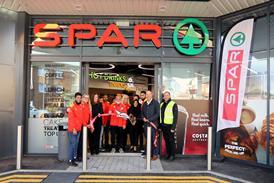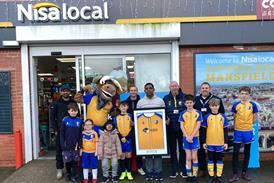Nigel: We have an amazing CCTV system; alarms; have removed the windows because they were broken so many times the insurance was withheld; and we've had shutters fitted.
Bob: We've got 14 CCTV cameras, three of which are outside. We also have red signs around telling people not to even think about shoplifting as we'll call the police.
Vickram: We have a security guard and about 20 different CCTV camera angles.
William: Police Community Support Officers (PCSOs) are quite effective, and we have CCTV both inside and out. We also make sure we move teens on before they congregate outside.
Nigel: Over the years we've had terrible problems gangs hanging around outside, vandalism, shoplifting, car tyres slashed, windows smashed. I've been hit on the head with a plank of wood and shot at with an air rifle. We've had so many bricks thrown at us, we've probably got enough to build an outhouse!
Bob: We used to get problems with teens hanging around. We've also had people trying it on with shoplifting.
Vickram: Youths tend to just stand around outside the store drinking, smoking weed, and asking people for fags.
William: Young people congregating outside and being noisy has been main issue.
Nigel: The continual vandalism of our area is one of the most damaging problems. Every shop in our parade has metal shutters fitted. It looks horrendous, but we don't have a choice.
Bob: Shoplifting is the biggest problem now. Travellers set up camp in the car parks nearby. The women spend half the day in the laundrette washing clothes and their kids get bored, which is when the trouble starts.
Vickram: There are always groups of youths annoying people outside the store. They put people off coming in sometimes if I'm parked outside I see people heading towards the store, turn around and go elsewhere it's very frustrating.
William: People hanging around outside intimidates customers, especially the elderly.
Nigel: When there are travellers in the area, trouble can start. We paid £42,000 for the shops in our parade to have new awnings and the travellers threw tins of paint all over them.
Bob: It mainly occurs when the travellers are in town, which is once every two or three weeks.
Vickram: It's particularly bad in the summer when the days get longer. Usually, if the weather is bad then people don't want to hang around outside, but sometimes even then you still see them.
William: In the early evening the teens tend to start meeting up outside. Problems also arise in the school holidays when the kids are bored.
Nigel: I always tell staff to call the police if they're in a threatening situation. We're part of a village partnership scheme now, so the police take anti-social behaviour issues a lot more seriously than they used to.
Bob: We call the police if we see anyone shoplifting we take a very strong line on that. The community wardens and PCSOs are great they really act fast.
Vickram: I don't bother to call the police. I used to phone them to say there's a group of about 15 young lads causing trouble and they'd send over two young female PCSOs who just got laughed at.
William: We work in partnership with the police, so they do take us seriously. We've set up a local office in the area for the police to work from the more we encourage police presence, the better for all of us.
What effect does community engagement have on reducing anti-social behaviour?
Nigel: A few years ago I joined a partnership in the area to improve conditions on the estate. We do lots of community work and that's what's turned things round for us. People realised we weren't just there to rip them off.
Bob: We organise a street party for National Independents' Week and give out coffee and mince pies at the Christmas carol service. It definitely helps us to integrate more. The shop is known locally as 'Bob's store'.
Vickram: My Dad used to own the business. He paid for fish and chip suppers for the elderly and sponsored the football team, but it hasn't really helped with anti-social behaviour. It's difficult because the council tend to house lots of immigrants here, so no one knows anyone and people are moving around all the time. There isn't really a sense of community.
William: We've just run a fun day, which involves all the locals. It's been a long, hard slog to integrate ourselves into the community, because we aren't originally from Devon, but I think that's done us more good than anything we've done with the police.
How big a problem is anti-social behaviour in the local community and how does it affect your business?Nigel: A few years ago I joined a partnership in the area to improve conditions on the estate. We do lots of community work and that's what's turned things round for us. People realised we weren't just there to rip them off.
Bob: We organise a street party for National Independents' Week and give out coffee and mince pies at the Christmas carol service. It definitely helps us to integrate more. The shop is known locally as 'Bob's store'.
Vickram: My Dad used to own the business. He paid for fish and chip suppers for the elderly and sponsored the football team, but it hasn't really helped with anti-social behaviour. It's difficult because the council tend to house lots of immigrants here, so no one knows anyone and people are moving around all the time. There isn't really a sense of community.
William: We've just run a fun day, which involves all the locals. It's been a long, hard slog to integrate ourselves into the community, because we aren't originally from Devon, but I think that's done us more good than anything we've done with the police.
Nigel: In the past it's been awful, but it hasn't been as bad recently. At one stage the crowds of teens around the store were so bad we had to pick up our night staff from directly outside the shop door in a van just to get them home safely.
Bob: It's not the problem it used to be three or four years ago, but we still get shoplifters from time to time.
Vickram: It's quite a big problem for us, to the point where it results in lost business.
William: We have our fair share of anti-social behaviour. It can affect your business if you're not firm at the outset, but we always have been.
Nigel: We put them through an induction course and licence training every three months so that they know how to deal with difficult customers. They're also constantly told not to put themselves in any danger.
Bob: Local community wardens give our staff guidance on how to deal with anti-social individuals.
Vickram: We tell staff never to leave the store stay where there are people and where they've got the CCTV cameras on them.
William: We train staff not to get involved with anti-social individuals. Just ask them to leave politely and if they don't do so on the third request, staff know to press the panic button.
Nigel: It helps to know your customers. A young lad once filled up a basket with alcohol and popped it on the counter. I told him there was no way I was serving him. I said: "First, your ID doesn't qualify, and second, I remember when you were born!"
Bob: Because I know a lot of shoppers by name, they have respect for me, which helps. With school-age children we ring up their school and their parents and show them what the kids have been up to on CCTV.
Vickram: As an independent retailer, I know many of the families in the area. The problem is that some parents around here don't care any more than the kids that's why the kids are the way they are.
William: I know 80% of customers by name, so if a stranger comes in I know about it. We also work with the Co-op and another store in the area, so if one store experiences a troublemaker, we are all made aware of it.
Nigel: It's really important to have employees you can trust. My staff have all worked with me for a number of years. They're all local and know all the customers and the parents of all the kids.
Bob: It's extremely important. I have very good staff. They've been with me for a few years now and they know to meet and greet people as they enter the store and to be aware of what's going on around them.
Vickram: All my staff are very reliable. When I'm taking on new staff I always explain to them from the word go that they will be expected to ask people for ID and to stand their ground and refuse customers who don't have valid documents.
William: Getting good staff is vital. Once the parameters have been set, responsible individuals can quickly learn how to deal with anti-social behaviour issues.
Nigel: Having police in the local area is extremely important it's a real crime deterrent. If we could get more police to patrol the area that would be good.
Bob: While the community wardens and PCSOs do a brilliant job, the police at the police station are a waste of time. They have very poor response times sometimes they don't turn up for days when I report a crime. They really need to raise their game.
Vickram: The one thing that would really make a difference is higher police visibility.
William: In this area we've got it pretty well covered and the police come promptly when we need them. I'd advise anyone with an anti-social behaviour problem to invite the police into their store. A strong police presence can really help.
How do you approach anti-social individuals?
Nigel: At one stage the police said I was having so many problems they'd put me on a bouncer training course to learn non-aggressive body language. I went on it and a few days later I approached a shoplifter. The next thing I knew he was pointing a knife at me! Luckily, I wasn't hurt, but it makes you realise there's only so much you can do.
Bob: There's no point in shouting at them; you just have to talk to them nicely and hope that they reciprocate.
Vickram: If you try to talk to them on their level then they're usually okay with you, whereas if you're aggressive and you shout then it backfires.
William: We ask people to move on politely the first time they start trouble, and after that we raise our tone. We also send out a written policy to locals explaining that if they look under 25 then they will be asked for ID when buying cigarettes and alcohol. If you convey the message that you won't tolerate this kind of behaviour, people don't try it on.
Nigel: At one stage the police said I was having so many problems they'd put me on a bouncer training course to learn non-aggressive body language. I went on it and a few days later I approached a shoplifter. The next thing I knew he was pointing a knife at me! Luckily, I wasn't hurt, but it makes you realise there's only so much you can do.
Bob: There's no point in shouting at them; you just have to talk to them nicely and hope that they reciprocate.
Vickram: If you try to talk to them on their level then they're usually okay with you, whereas if you're aggressive and you shout then it backfires.
William: We ask people to move on politely the first time they start trouble, and after that we raise our tone. We also send out a written policy to locals explaining that if they look under 25 then they will be asked for ID when buying cigarettes and alcohol. If you convey the message that you won't tolerate this kind of behaviour, people don't try it on.


















No comments yet